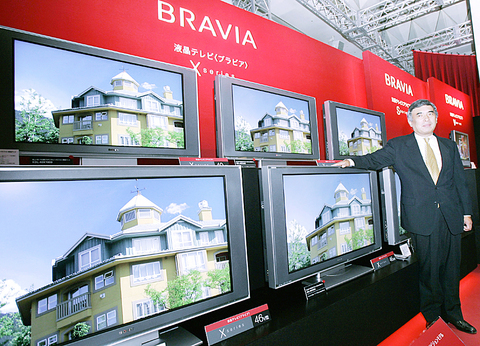Samsung Electronics Co and Sony Corp had to overcome cultural barriers in their joint liquid-crystal display (LCD) venture but by doing so created a new market, according to a top Samsung executive.
The two global electronics giants established S-LCD Corp in the city of Asan, about 90km south of Seoul, in April 2004 to produce panels to meet soaring demand for flat screen televisions.
Sony's Japanese devotion to detail ran up against Samsung's Korean-style emphasis on speed, Lee Sang-wan, president and CEO of Samsung's LCD business, told reporters.

PHOTO: AP
"So at first it worked as a cultural barrier between the two companies or two countries but now it is becoming a synergy," he said. "They are very detail oriented and we are very speedy at working."
Lee made the comments on Friday but they were embargoed for release till yesterday by Samsung.
Global demand for flat screen televisions has soared as consumers abandon their bulky cathode ray tube sets for the thinner, sleeker versions.
Samsung said on Thursday it expects the global market for LCD TV panels to grow 53 percent to 73 million units next year.
Samsung and Sony currently produce 40-inch and 46-inch panels using Samsung technology at their "seventh-generation" production line, a sleek, state-of-the art facility staffed by industrial robots and humans working in special "clean rooms."
"We created the 40-inch LCD TV market with Sony," said Lee, who attributed its success to the popularity of Samsung's Bordeaux and Sony's Bravia models, which both use panels made at the facility in Asan's Tangjeong district.
"Sony's role in opening that market and realizing growth has been important," he said.
The companies, whose products such as televisions and personal computers compete against each other in global markets, cooperate in LCD panels to ensure supply.

GAINING STEAM: The scheme initially failed to gather much attention, with only 188 cards issued in its first year, but gained popularity amid the COVID-19 pandemic Applications for the Employment Gold Card have increased in the past few years, with the card having been issued to a total of 13,191 people from 101 countries since its introduction in 2018, the National Development Council (NDC) said yesterday. Those who have received the card have included celebrities, such as former NBA star Dwight Howard and Australian-South Korean cheerleader Dahye Lee, the NDC said. The four-in-one Employment Gold Card combines a work permit, resident visa, Alien Resident Certificate (ARC) and re-entry permit. It was first introduced in February 2018 through the Act Governing Recruitment and Employment of Foreign Professionals (外國專業人才延攬及雇用法),

RESILIENCE: Deepening bilateral cooperation would extend the peace sustained over the 45 years since the Taiwan Relations Act, Greene said Taiwan-US relations are built on deep economic ties and shared values, American Institute in Taiwan (AIT) Director Raymond Greene said yesterday, adding that strengthening supply chain security in critical industries, enhancing societal resilience through cooperation and deepening partnerships are key to ensuring peace and stability for Taiwan in the years ahead. Greene made the remarks at the National Security Youth Forum, organized by National Taiwan University’s National Security and Strategy Studies Institution in Taipei. In his address in Mandarin Chinese, Greene said the Taiwan-US relationship is built on deep economic ties and shared interests, and grows stronger through the enduring friendship between

CAUTION URGED: Xiaohongshu and Douyin — the Chinese version of TikTok — are tools the Chinese government uses for its ‘united front’ propaganda, the MAC said Mainland Affairs Council (MAC) Minister Chiu Chui-cheng (邱垂正) yesterday urged people who use Chinese social media platforms to be cautious of being influenced by Beijing’s “united front” propaganda and undermining Taiwan’s sovereignty. Chiu made the remarks in response to queries about Chinese academic Zhang Weiwei (張維為) saying that as young Taiwanese are fond of interacting on Chinese app Xiaohongshu (小紅書, known as RedNote in English), “after unification with China, it would be easier to govern Taiwan than Hong Kong.” Zhang is professor of international relations at Shanghai’s Fudan University and director of its China Institute. When giving a speech at China’s Wuhan

ENHANCE DETERRENCE: Taiwan has to display ‘fierce resolve’ to defend itself for China to understand that the costs of war outweigh potential gains, Koo said Taiwan’s armed forces must reach a high level of combat readiness by 2027 to effectively deter a potential Chinese invasion, Minister of National Defense Wellington Koo (顧立雄) said in an interview with the Chinese-language Liberty Times (sister newspaper of the Taipei Times) published yesterday. His comments came three days after US Secretary of State Marco Rubio told the US Senate that deterring a Chinese attack on Taiwan requires making a conflict “cost more than what it’s worth.” Rubio made the remarks in response to a question about US policy on Taiwan’s defense from Republican Senator John Cornyn, who said that Chinese